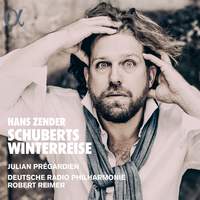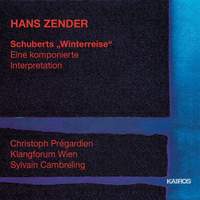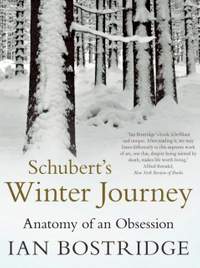Interview,
Julian Prégardien on Hans Zender's Winterreise
 As the year draws to a close, I’ve been touching base with some of the artists whose recordings have really stood out to me as something special over the last few months, and recently had the pleasure of chatting to the German tenor Julian Prégardien, whose febrile and atmospheric recording of Hans Zender’s ‘composed interpretation’ of Schubert’s Winterreise (scored for voice and small orchestra, and premiered in 1993) was one of my Editor’s Choices back in September. I spoke to Julian about his experiences performing the work on stage, the differences between Zender’s arrangement and Schubert’s original, and the contrasts between his own recording and his father Christoph’s…
As the year draws to a close, I’ve been touching base with some of the artists whose recordings have really stood out to me as something special over the last few months, and recently had the pleasure of chatting to the German tenor Julian Prégardien, whose febrile and atmospheric recording of Hans Zender’s ‘composed interpretation’ of Schubert’s Winterreise (scored for voice and small orchestra, and premiered in 1993) was one of my Editor’s Choices back in September. I spoke to Julian about his experiences performing the work on stage, the differences between Zender’s arrangement and Schubert’s original, and the contrasts between his own recording and his father Christoph’s…
Your father is one of the very few other singers to have recorded Zender’s Winterreise – was it through him that you originally came across the work?
I never actually heard him sing it live! The reason why I started to consider this piece as part of my repertoire was thanks to an invitation from the Grand Théâtre de la Ville de Luxembourg, who were planning a staged version which coincided with my plans to sing the original cycle anyway. The production took place in the winter of 2015/2016, but I’d sung my first Winterreise in early 2015 (that was also in an arrangement, by the way, for wind quintet and accordion), and was working on it with the pianist Gerhardt Oppitz and the fortepianist Masato Suzuki, as well as with a guitar duo in early 2016 – then in the middle of all those projects this invitation from Luxembourg occurred, so I was in the lucky situation of being able to sing the cycle in four or five different versions within less than a year!
Could you tell me a little about the Luxembourg staging? How did it compare to Netia Jones’s production with Ian Bostridge at the Barbican, which happened round about the same time and made heavy use of video-art?
There was video-art in Luxembourg too, of course – I think there’s almost no 21st-century staging that doesn’t involve a video-artist! But our approach to putting this piece on stage was very different to that Barbican project: I know Ian’s take on the piece was quite ironic, whereas ours was rather naturalistic. I worked with a young stage directress from Sarajevo [Jasmina Hadžiahmetović], and we established a very deep dialogue about the emotional layers of the piece. For me, Winterreise is more about a state of mind than it is about a specific character, and we tried to translate that into body language – so it was quite a desperate staging! In fact, the protagonist of Winterreise is not a character in a drama by Ibsen, Schiller, Shakespeare – it’s more like a poetic device, which in German we call the ‘lyrische ‘Ich’’ (the lyrical ‘I’’). The journey is more of an inner journey but Zender evokes so powerfully all sorts of non-musical noises, including a wind-machine! I find that a very interesting ambivalence.
In which songs do you think Zender departs most radically from Schubert’s original?
Without any doubt it’s 'Die Nebensonnen', where Zender has three different rhythmical layers representing the three suns. It’s a piece that’s like a living organism. In terms of instrumentation, the most provocative one is maybe ‘Der Leiermann’, where a saxophone takes the melodic part of the Leiermann, and duets with the first violin who plays the same melody in half the tempo: that’s quite something! And ‘Frühlingstraum’ is incredibly touching as (to me at least) it seems even more lonely and desperate than ever thanks to the accompaniment of harp and solo violin for the verses. The second verse in particular is just so heart-breaking – for me even more so than the sound of a Steinway or even a fortepiano. It’s like a concentrated essence of the original song.
How easily does a piece that’s as filmic as this translate onto a recording?
It was always clear in my mind that if I recorded this particular piece then I would have to do it live. In a recording-studio you aim for perfection, but by the very nature of Zender’s arrangement the aim instead has to be to simply take up the challenge rather than to strive for some sort of ideal. Every one of the 25 musicians involved has to be prepared to really live through it, and in my opinion that process actually needs to be audible. I say this quite objectively, but I find my recording’s quite different from the others in the catalogue: there’s one with Hans Zender himself conducting, from 1994 (a year after he wrote the piece) with Hans Peter Blochwitz, one with Ensemble Modern from Frankfurt that’s no longer on sale, and then there’s my father’s recording with Klangforum Wien and Sylvain Cambreling. Cambreling is known to be a specialist for that kind of contemporary repertoire and my father of course is a major interpreter of Winterreise (not only in my opinion). Their approach seems to be very sensitive and intellectual rather than expressive and spontaneous - though in fact my father doesn’t like to be called an intellectual! He’s very intuitive and psychologically sensitive, I would say, but you also hear in that recording that he has a huge respect for the piece itself.
My own recording, I think, also demonstrates respect, albeit in different ways: I’m very lucky to be in touch with Hans Zender himself. We exchanged letters whilst I was working on the piece, and it became very clear that somehow taking possession of ‘his’ score was exactly what he expected of me – he felt that as a composer who had already interpreted someone else’s composition, he couldn’t legitimately say ‘Only do what I have written’! He found it interesting, for example, that I had reinstated some of Müller’s original lyrics which Schubert altered – something that Zender wasn’t aware of when he composed his interpretation. We’re only talking small changes here, but they’re significant ones: the word-order is slightly different in the first song, ‘Gute Nacht’, and in ‘Erstarrung’ it’s ‘Mein Herz ist wie erfroren’ (‘My heart is as though frost-bitten’) rather than ‘Mein Herz ist wie erstorben’ (My heart is as though dead’). I always strive to be an intellectually-aware artist, and so my perspective is that as I’m in possession of that information, how could I defend not using it? And that’s essentially the philosophy of historically-informed performance: to gain a certain amount of artistic freedom by knowing, rather than only by feeling. It’s perfectly possible to take that approach, I think, without precluding spontaneity in performance, or negatively affecting your dialogue with your audience.
Where do you stand on stagings of Winterreise? Do you feel it’s gilding the lily, or does it perhaps lend itself to dramatisation rather better than other song-cycles?
I have a good friend, the German baritone Johannes Held, who runs a small lieder festival called Der Zwerg in Sindelfingen, and together with a Swedish pianist called Daniel Beskow he’s created a project called Winterreise STAGED (you can watch a trailer on their homepage here). They focus on showing the emotional world of the cycle to people who might be afraid to go to a conventional song-recital (and there are many who are, because they think it’s too distant, too intellectual, too bourgeois in a way); they take it really word-by-word and everything they do on stage is incredibly natural, which I think is a great way to break down imaginary walls.
I read a review of my album in The Guardian recently, and the last sentence reads ‘Does Schubert need all this? Of course not, but that’s no reason not to do it!’. And that’s a pretty good answer to your question, I think: Schubert’s Winterreise doesn’t need a staging to touch or to be understood by other human beings, as it’s one of the biggest masterworks in the history of music, but it can be interesting to take a different approach and widen the horizon for the piece. On a similar note, I adore Ian Bostridge’s great book about the cycle: I often find that books by singers can be overly subjective, but no-one could accuse Ian of that!
This is your debut recording on Alpha – what’s next?
The next album, which is already recorded, will be a Schumann disc with Eric Le Sage, featuring a guest appearance from Sandrine Piau: Dichterliebe is the centrepiece, and around it I did a selection of songs which explore the state of mind of Clara Schumann around the time of their wedding (and, specifically, the possibility of the wedding not actually coming off!). In April 2019 Eric and I come to Wigmore Hall to sing Liederkreis Op. 24, and then the next big thing planned recording-wise is Schwanengesang with Martin Helmchen, which we’ve done at Wigmore as well. (I really see Wigmore Hall as the mecca of chamber music, and in terms of what we were just discussing about breaking down barriers I think they do a fantastic job of attracting new audiences – the penultimate recital I gave there was part of the Young Audience programme, where under-35s can attend for £10, and I was simply raving afterwards! I saw more people there below forty than over forty!). And there’s also another orchestral project in the pipeline with Alpha – it will be based around the German Romantic tenor roles, starting from Mozart and exploring Schubert from another direction…
Zender: Schubert's Winterreise was released on Alpha on 21st September, and was a Presto Editor's Choice that month.
Available Formats: CD, MP3, FLAC, Hi-Res FLAC
Julian's father Christoph's recording of the work was released on Kairos in 2000.
Available Format: 2 CDs
Drawing equally on his vast experience of performing this work (he has performed it more than a hundred times), on his musical knowledge and on his training as a scholar, Bostridge unpicks the enigmas and subtle meaning of each of the twenty-four songs to explore for us the world Schubert inhabited, bringing the work and its world alive for connoisseurs and new listeners alike.
Available Format: Book





